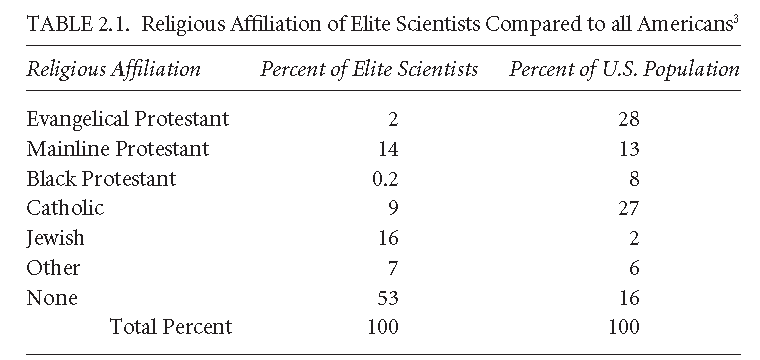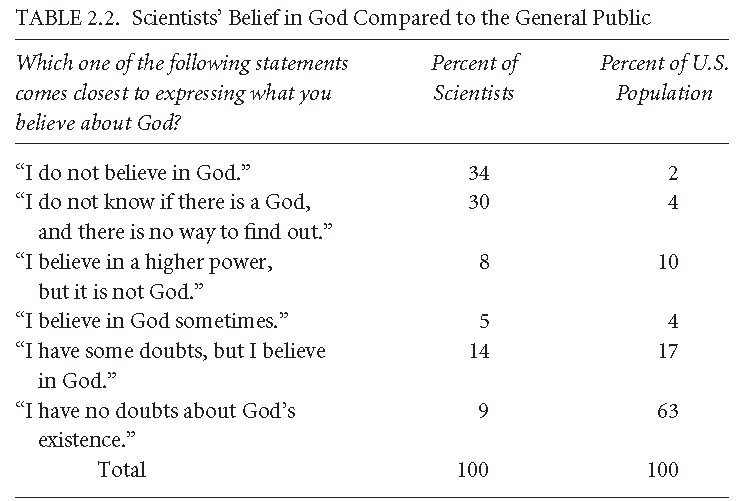I’ve been on a bit of a metaphysics kick. In the last year, I’ve read:
- Roger Scruton, The Soul of the World (Princeton University Press, 2014).
- Thomas Nagel, Mind and Cosmos: Why the Materialist Neo-Darwinian Conception of Nature Is Almost Certainly False (Oxford University Press, 2012).
- David Bentley Hart, The Experience of God: Being, Consciousness, Bliss (Yale University Press, 2013).
- Alvin Plantinga, Where the Conflict Really Lies: Science, Religion, and Naturalism (Oxford University Press, 2011).
These readings have made me more interested in ways of knowing and–as the publishers should indicate–our institutions of knowledge. What do those within these institutions (and thus those typically generating new knowledge) think and believe?
According to sociologist Elaine Howard Ecklund’s study, 47% of elite scientists in U.S. have a religious tradition, while 34% of American scientists profess atheism, 30% profess agnosticism, and 36% profess at least some form of belief in a “higher power” (God or otherwise). Furthermore, she explains, “Nearly 60 percent of scientists I interviewed displayed a spirituality that scholars might call “thin.””[ref]Ecklund, 2010, pg. 53.[/ref]


Philosopher Helen De Cruz summarizes the sociological data on spirituality within academia:
Atheism and agnosticism are widespread among academics, especially among those working in elite institutions. A survey among National Academy of Sciences members (all senior academics, overwhelmingly from elite faculties) found that the majority disbelieved in God’s existence (72.2%), with 20.8% being agnostic, and only 7% theists (Larson and Witham 1998). Ecklund and Scheitle (2007) analyzed responses from scientists (working in the social and natural sciences) from 21 elite universities in the US. About 31.2% of their participants self-identified as atheists and a further 31 % as agnostics. The remaining number believed in a higher power (7%), sometimes believed in God (5.4%), believed in God with some doubts (15.5%), or believed in God without any doubts (9.7%). In contrast to the general population, the older scientists in this sample did not show higher religiosity—in fact, they were more likely to say that they did not believe in God. On the other hand, Gross and Simmons (2009) examined a more heterogeneous sample of scientists from American colleges, including community colleges, elite doctoral-granting institutions, non-elite four-year state schools, and small liberal arts colleges. They found that the majority of university professors (full-time tenured or tenure-track faculty) had some theistic beliefs, believing either in God (34.9%), in God with some doubts (16.6%), in God some of the time (4.3%), or in a higher power (19.2%). Belief in God was influenced both by type of institution (lower theistic belief in more prestigious schools) and by discipline (lower theistic belief in the physical and biological sciences compared to the social sciences and humanities).
These latter findings indicate that academics are more religiously diverse than has been popularly assumed and that the majority are not opposed to religion. Even so, in the US the percentage of atheists and agnostics in academia is higher than in the general population, a discrepancy that requires an explanation. One reason might be a bias against theists in academia. For example, when sociologists were surveyed whether they would hire someone if they knew the candidate was an evangelical Christian, 39.1% said they would be less likely to hire that candidate—there were similar results with other religious groups, such as Mormons or Muslims (Yancey 2012). Another reason might be that theists internalize prevalent negative societal stereotypes, which leads them to underperform in scientific tasks and lose interest in pursuing a scientific career. Kimberly Rios et al. (2015) found that non-religious participants believe that theists, especially Christians, are less competent in and less trustful of science. When this stereotype was made salient, Christian participants performed worse in logical reasoning tasks (which were misleadingly presented as “scientific reasoning tests”) than when the stereotype was not mentioned.
It is unclear whether religious and scientific thinking are cognitively incompatible. Some studies suggest that religion draws more upon an intuitive style of thinking, distinct from the analytic reasoning style that characterizes science (Gervais and Norenzayan 2012). On the other hand, the acceptance of theological and scientific views both rely on a trust in testimony, and cognitive scientists have found similarities between the way children and adults understand testimony to invisible entities in religious and scientific domains (Harris et al. 2006). Moreover, theologians such as the Church Fathers and Scholastics were deeply analytic in their writings, indicating that the association between intuitive and religious thinking might be a recent western bias. More research is needed to examine whether religious and scientific thinking styles are inherently in tension.
How about philosophers? A 2014 study came up with the following numbers (from pgs. 14-16 of the ungated version). I’ve highlighted a few that stand out to me:
1. A priori knowledge: yes 71.1%; no 18.4%; other 10.5%.
2. Abstract objects: Platonism 39.3%; nominalism 37.7%; other 23.0%.
3. Aesthetic value: objective 41.0%; subjective 34.5%; other 24.5%.
4. Analytic-synthetic distinction: yes 64.9%; no 27.1%; other 8.1%.
5. Epistemic justification: externalism 42.7%; internalism 26.4%; other 30.8%.
6. External world: non-skeptical realism 81.6%; skepticism 4.8%; idealism 4.3%; other
9.2%.
7. Free will: compatibilism 59.1%; libertarianism 13.7%; no free will 12.2%; other
14.9%.
8. God: atheism 72.8%; theism 14.6%; other 12.6%.
9. Knowledge claims: contextualism 40.1%; invariantism 31.1%; relativism 2.9%;
other 25.9%.
10. Knowledge: empiricism 35.0%; rationalism 27.8%; other 37.2%.
11. Laws of nature: non-Humean 57.1%; Humean 24.7%; other 18.2%.
12. Logic: classical 51.6%; non-classical 15.4%; other 33.1%.
13. Mental content: externalism 51.1%; internalism 20.0%; other 28.9%.
14. Meta-ethics: moral realism 56.4%; moral anti-realism 27.7%; other 15.9%.
15. Metaphilosophy: naturalism 49.8%; non-naturalism 25.9%; other 24.3%.
16. Mind: physicalism 56.5%; non-physicalism 27.1%; other 16.4%.
17. Moral judgment: cognitivism 65.7%; non-cognitivism 17.0%; other 17.3%.
18. Moral motivation: internalism 34.9%; externalism 29.8%; other 35.3%.
19. Newcomb’s problem: two boxes 31.4%; one box 21.3%; other 47.4%.
20. Normative ethics: deontology 25.9%; consequentialism 23.6%; virtue ethics 18.2%;
other 32.3%.
21. Perceptual experience: representationalism 31.5%; qualia theory 12.2%; disjunctivism
11.0%; sense-datum theory 3.1%; other 42.2%.
22. Personal identity: psychological view 33.6%; biological view 16.9%; further-fact
view 12.2%; other 37.3%.
23. Politics: egalitarianism 34.8%; communitarianism 14.3%; libertarianism 9.9%;
other 41.0%.
24. Proper names: Millian 34.5%; Fregean 28.7%; other 36.8%.
25. Science: scientific realism 75.1%; scientific anti-realism 11.6%; other 13.3%.
26. Teletransporter: survival 36.2%; death 31.1%; other 32.7%.
27. Time: B-theory 26.3%; A-theory 15.5%; other 58.2%.
28. Trolley problem: switch 68.2%; don’t switch 7.6%; other 24.2%.
29. Truth: correspondence 50.8%; deflationary 24.8%; epistemic 6.9%; other 17.5%.
30. Zombies: conceivable but not metaphysically possible 35.6%; metaphysically possible
23.3%; inconceivable 16.0%; other 25.1%
What’s interesting is that while nearly 73% of philosophers are atheist, only about half are naturalists or physicalists when it comes to the mind. Furthermore, nearly 40% would consider themselves Platonists, indicating the possibility of a Platonic atheism. Yet, when you consider philosophers of religion, the numbers reverse:[ref]This, of course, may be due to selection bias. Nonetheless, it’s worth noting that the experts in religion tend to be theists and non-naturalists.[/ref]
| Answer | Correlation coefficient | |||||||||||||||||
|---|---|---|---|---|---|---|---|---|---|---|---|---|---|---|---|---|---|---|
| God:theism | 0.351 | |||||||||||||||||
Response pairs: 917 p-value: < 0.001
|
||||||||||||||||||
| Free will:libertarianism | 0.262 | |||||||||||||||||
Response pairs: 899 p-value: < 0.001
|
||||||||||||||||||
| not Free will:compatibilism | 0.207 | |||||||||||||||||
Response pairs: 899 p-value: < 0.001
|
||||||||||||||||||
| Mind:non-physicalism | 0.193 | |||||||||||||||||
Response pairs: 918 p-value: < 0.001
|
||||||||||||||||||
| Metaphilosophy:non-naturalism | 0.19 | |||||||||||||||||
Response pairs: 855 p-value: < 0.001
|
||||||||||||||||||
| Time:A-theory | 0.145 | |||||||||||||||||
Response pairs: 583 p-value: < 0.001
|
||||||||||||||||||
| Meta-ethics:moral realism | 0.142 | |||||||||||||||||
Response pairs: 896 p-value: < 0.001
|
||||||||||||||||||
| Personal identity:further-fact view | 0.14 | |||||||||||||||||
Response pairs: 813 p-value: < 0.001
|
||||||||||||||||||
| Laws of nature:non-Humean | 0.114 | |||||||||||||||||
Response pairs: 864 p-value: < 0.001
|
||||||||||||||||||
| Moral judgment:cognitivism | 0.112 | |||||||||||||||||
Response pairs: 875 p-value: < 0.001
|
||||||||||||||||||
| Mental content:internalism | 0.108 | |||||||||||||||||
Response pairs: 857 p-value: 0.001
|
||||||||||||||||||
| not Politics:egalitarianism | 0.107 | |||||||||||||||||
Response pairs: 751 p-value: 0.003
|
||||||||||||||||||
| not Personal identity:psychological view | 0.106 | |||||||||||||||||
Response pairs: 813 p-value: 0.002
|
||||||||||||||||||
| Perceptual experience:sense-datum theory | 0.101 | |||||||||||||||||
Response pairs: 716 p-value: 0.006
|
||||||||||||||||||
| Aesthetic value:objective | 0.099 | |||||||||||||||||
Response pairs: 895 p-value: 0.003
|
||||||||||||||||||
| A priori knowledge:yes | 0.093 | |||||||||||||||||
Response pairs: 918 p-value: 0.004
|
||||||||||||||||||
| not Normative ethics:consequentialism | 0.092 | |||||||||||||||||
Response pairs: 800 p-value: 0.009
|
||||||||||||||||||
| Knowledge:rationalism | 0.091 | |||||||||||||||||
Response pairs: 919 p-value: 0.005
|
||||||||||||||||||
| Perceptual experience:qualia theory | 0.087 | |||||||||||||||||
Response pairs: 716 p-value: 0.019
|
||||||||||||||||||
| Truth:correspondence | 0.085 | |||||||||||||||||
Response pairs: 863 p-value: 0.012
|
||||||||||||||||||
| Newcomb’s problem:one box | 0.084 | |||||||||||||||||
Response pairs: 663 p-value: 0.03
|
||||||||||||||||||
| Zombies:metaphysically possible | 0.083 | |||||||||||||||||
Response pairs: 825 p-value: 0.017
|
||||||||||||||||||
| not Truth:deflationary | 0.073 | |||||||||||||||||
Response pairs: 863 p-value: 0.032
|
||||||||||||||||||
| Teletransporter:death | 0.066 | |||||||||||||||||
Response pairs: 818 p-value: 0.059
|
||||||||||||||||||
| Normative ethics:virtue ethics | 0.062 | |||||||||||||||||
Response pairs: 800 p-value: 0.079
|
||||||||||||||||||
| Politics:libertarianism | 0.05 | |||||||||||||||||
Response pairs: 751 p-value: 0.171
|
||||||||||||||||||
| Analytic-synthetic distinction:yes | 0.05 | |||||||||||||||||
Response pairs: 920 p-value: 0.129
|
||||||||||||||||||
All of this is utterly fascinating, particularly for me as I try to work my way through a coherent Mormon metaphysics.